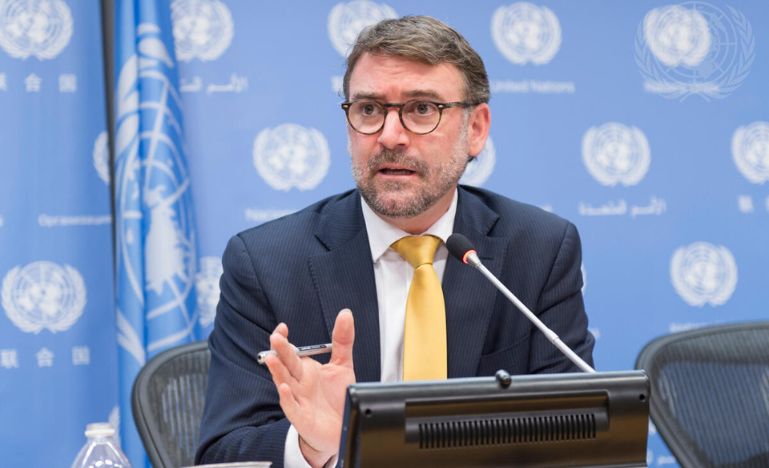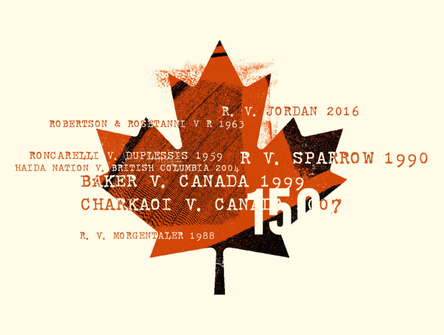Holding states to account
Law prof Bernard Duhaime is the UN's new special rapporteur on the promotion of truth, justice, reparation, memorialization and guarantees of non-recurrence

Bernard Duhaime used to chase ghosts and help find thousands who fell victim to state-sponsored disappearances. Now, he will be monitoring global hotspots of gross violations of human rights and international humanitarian law in the wake of conflicts and ends of authoritarian rule.
In May, the UN appointed the human rights law professor at the Université du Québec à Montréal the special rapporteur on the promotion of truth, justice, reparation, memorialization and guarantees of non-recurrence. In his new role, Duhaime will deal with highly complex legal issues and politically fraught matters while encouraging the implementation of the international legal standards underpinning the five pillars of transitional justice in societies trying to move forward.
Transitional justice, a concept that emerged in the late 1980s and early 1990s following political changes in Eastern Europe and Latin America, is not a special form of justice. It entails a series of holistic approaches involving tailored judicial and non-judicial measures to address past human rights abuses in a way that helps show the truth about what happened, promotes accountability for past violations, usually through criminal prosecutions or truth commissions, and ensures redress and reparations for victims. It also fosters efforts to preserve historical memory and seeks to prevent the repetition of gross human rights abuses and violations by tackling the root of the abuses.
“The rapporteur's role is to assiduously monitor the way governments adopt these measures to prevent this kind of thing from happening again,” says Duhaime, the former head of the UN’s Working Group on Enforced or Involuntary Disappearances and member of McGill University’s Centre for Human Rights and Legal Pluralism.
“This can take time, and so it’s important for the international community, through the special rapporteurs, to follow up.”
He will have his work cut out for him. The world is rife with tension. Nearly 100 countries are engaged in a conflict beyond their borders, the most since 2008, according to the 2024 Global Peace Index report. As the think-tank Institute for Economics & Peace has noted, that will likely complicate negotiations for lasting peace and prolong conflicts. The surge of hard-right populists, who have a profound skepticism of multilateral organizations such as the UN and a brazen penchant for historical revisionism, will make Duhaime’s work even more challenging.
A growing number of states are denying or minimizing the role they played in committing state violence. Argentina, for example, disputes the fact that more than 30,000 citizens disappeared between 1976 and 1983, putting the figure closer to 7,000. In Bosnia, politicians refute claims that massacres of Muslims took place at Srebrenica. Other jurisdictions are trying to justify past human rights abuses by maintaining it was driven by national security reasons.
In some cases, states are backtracking and calling into question the adopted transitional justice measures. That’s the case in some regions in Spain, which are questioning efforts of truth, remembrance and reparation for the victims of the Civil War and Franco’s 36-year authoritarian regime.
“This is completely unacceptable and extremely dangerous,” says Duhaime.
“That's why this type of procedure was designed — to ensure that atrocities are not forgotten and that all transitional measures are adopted for the benefit of the victims. In 2024, we can’t rewrite part of recent history to try and win the sympathy of certain sections of the population.”
Last year, Duhaime’s predecessor, Fabián Salvioli, an Argentinian human rights lawyer and professor, painted a dismal portrait of the current state of things. He wrote that many transitional justice processes are “wrecked” by political decisions that have led to the “delegitimization” of truth-seeking actions.
Salvioli also lamented the lack of impunity and comprehensive reparations for victims, the “maintenance of institutional frameworks” that favour violations, the exculpation of past violations, and the absence or boycotting of memory initiatives.
In a scathing report, Salvioli bemoaned the fact that only about 15 per cent of transitional societies have implemented reparations for victims.
This is what Geoffrey Dancy, a University of Toronto expert on transitional justice efforts, describes as the paradox of satisfaction. The more you pursue these accountability mechanisms, the more they are provided and supplied, and the more dissatisfied people who have been victimized and lived through the trauma of war are.
“They’re able to voice their dissatisfaction more, which is a positive thing,” says Dancy, who specializes in the empirical study of human rights.“Before, there was no outlet. Now, there’s an outlet, and with that comes the full spectrum of responses. We shouldn’t expect there to be a uniformly positive response to these kinds of mechanisms.”
Duhaime does not disagree with Salvioli’s assessments, albeit with some nuances. The 51-year old Montrealer acknowledges that in many countries, traditional and transitional justice are facing problems that are still “very acute.” In Asian nations such as Indonesia, Nepal, and the Philippines, progress for transitional justice remains slow, while in Africa, there are a slew of countries still recovering from conflict or dictatorships.
But Duhaime maintains that it’s rare for a state to invite a special rapporteur only to completely “short-circuit” the process. If they have no intention of participating in the exercise, they wouldn’t involve an independent expert. However, he says states that do invite the special rapporteur to investigate, assess, advise and make recommendations often have governments that genuinely intend to find solutions to complex social problems and want to be accompanied by the international community to “show that they are doing the right thing.”
Duhaime says states that meet with special rapporteurs also have an obligation to deal in good faith. In addition to customary international law, 13 key international legal instruments guide the special rapporteur, as well as three that deal with children, two with gender, and one with reparations.
“When a special rapporteur mentions that a state is violating or needs to improve its compliance with an obligatory norm, the state in principle has a good-faith obligation to implement (their) recommendations because states are obliged to comply with the rules of international law invoked by the rapporteurs,” Duhaime says.
Denouncing violations, recommending measures that need to be put in place, and keeping up the pressure on the state “inevitably” leads to change.
Despite the hiccups and challenges, Duhaime is convinced transitional justice has made strides over the past two decades. Concerns about victims were on the periphery of measures in the 1990s. Today, the preferred approach puts victims at the heart of the process and their interests at the heart of negotiations. Among the functional transitional justice measures that ensure victims’ right to justice are criminal investigations and trials of perpetrators. International institutions such as the International Criminal Court are now far more active than they were some decades ago.
“The actors who are at the heart of these transitions, be they warring parties in an armed conflict or authorities of a dictatorial regime, are very much aware that their actions can now be investigated and sanctioned by the international community … or by the exercise of other measures undertaken by national courts in other countries,” Duhaime says.
There are questions over whether special rapporteurs ultimately bring about change. Dancy says they identify important problems but what’s done to address them remains unanswered.
“They probably have influence, but I don’t have evidence to back it up,” he says, adding he believes it’s helpful to have international attention focused on states in the midst of transition.
“We see that when there are other types of investigations and monitoring bodies that are present, reformers are able to get more things done.”
Duhaime is now contemplating which countries he would like to approach to scrutinize. As special rapporteur, he’s expected to issue thematic reports and annually visit two countries in flux at their invitation. There’s currently a backlog of requests made to countries, including Brazil, Cambodia, Democratic Republic of Congo, and the Ivory Coast, that were made by previous rapporteurs and are still pertinent. For now, Duhaime is waiting for permission to visit.
“I’m lucky enough to have one foot in academia and one foot in the action,” he says.
“When you take an interest in human rights and international law and are active in defending people's rights, you find yourself sucked into some impressive political and historical contexts.”


